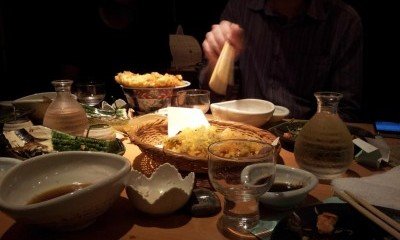Buono, an Italian-named but authentically Japanese tempura restaurant in the back streets of central Tokyo’sNishi-Azabu neighborhood, about 10 minutes on foot from both Roppongi Hills to the east and Hiroo Station to the south. Buono’s concept is as appealing as its menu: serve top-quality tempura at accessible prices so that average people can experience what this well known Japanese specialty should taste like.
The chef at Buono claims to have spent his past 39 years in tempura kitchens, starting out at the age of 17. He’d always worked in expensive, upscale restaurants before venturing into Buono’s more reasonably priced bracket. The clientele may be different (including riff-raff like us), but the product is the same.
For the full tempura experience, the best choices are the 3,500-yen and 5,000-yen sets. While not exactly cheap (except in relative terms), you will remember your meal fondly. Go full out, while you’re there. The first course will probably be okayu—a small, bland portion of boiled rice that prepares your stomach for what’s to come. This will be followed by numerous servings of tempura and complements such as sesame tofu and the finest ika (squid) sashimi. The selection changes according to what is fresh, so don’t be surprised by variations.
If you are only interested in tempura without all the extras, Buono’s 1,800-yen Chef’s Recommendation includes 7 types, highlighted by the ever-popular (and gargantuan) ebi. One lesson I learned during the evening was that aficionados don’t dip their ebi in tempura sauce—they prefer to lightly sprinkle it with salt. Our table was set with three kinds of salt: matcha (green tea), sansho (spicy) and regular.
For smaller budgets and appetites, there is a ten-don (variety of tempura on rice) and a kakiage-don on the menu for around 1,000-yen each. Kakiage is a mixture of tempura ingredients all fried up together. You can find some very uninspiring ones in convenience store bentos, but the kakiage served at Buono is a nice meal in itself.
The refreshment options are plentiful, and the staff are happy to help you make some good choices to match your meals.
A final word of advice, should you find yourself at Buono, is to inquire about the “secret” menu of whatever is fresh and not in the regular rotation. For us it was ayu, a freshwater fish with a light, tasty meat. It is this kind of unique (or unique-seeming) experience that makes my time in Japan memorable.




